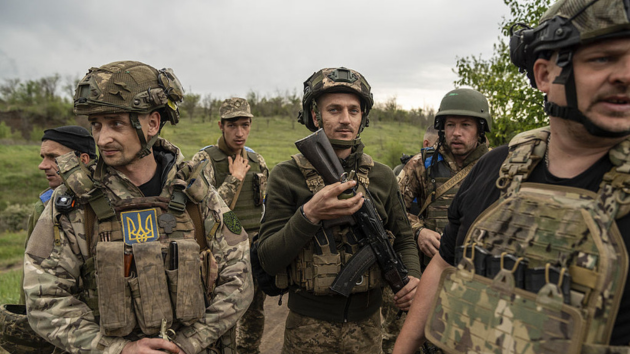
(LONDON) -- President Vladimir Putin appears to be facing a dilemma as Russian and Ukrainian representatives prepare for direct peace talks in Istanbul, Turkey, on Thursday.
Having repeatedly dodged Ukrainian and U.S. calls for a full 30-day ceasefire, the Russian leader instead offered direct talks between the Ukrainian and Russian teams in Istanbul -- a proposal President Donald Trump enthusiastically backed.
The offer appeared significant -- the talks, if they go ahead, will be the first direct peace negotiations between the two sides since the early weeks of Moscow's full-scale invasion in February 2022.
Zelenskyy, though, decided to up the stakes. "I will be waiting for Putin in [Turkey] on Thursday. Personally," he wrote in a post on X. "I hope that this time the Russians will not look for excuses."
The offer for the two presidents to meet face to face represents a challenge to Putin, who has not met with Zelenskyy since 2019, has repeatedly sought to undermine the Ukrainian president's legitimacy and suggested it would not be suitable for Moscow to negotiate directly with Kyiv.
"Zelenskyy has put Putin in a situation where no matter what Putin does, he loses," Oleksandr Merezhko -- a member of the Ukrainian parliament representing Zelenskyy's party -- told ABC News. "If Putin doesn't show up in Istanbul then he loses," Merezhko added. "The world will see that Putin doesn't want any negotiations."
"If Putin doesn't show up, then imagine how it will look -- on one hand the young defiant leader of a heroic country and on the other hand an old dictator, war criminal," Merezhko added. "Putin cannot afford to look like this. So, the chances that he will show up in Istanbul are slim."
The Kremlin has so far been silent on whether Putin will meet with Zelenskyy, while reiterating the president's offer of direct negotiations in Istanbul. "Overall, we remain committed to a serious effort toward a long-term peaceful resolution," Kremlin spokesperson Dmitry Peskov said on Monday.
Konstantin Kosachev -- the deputy speaker of Russia's Federation Council, the upper house of the Russian parliament -- reportedly suggested Putin would not attend.
Kosachev told the Rossiya-24 TV channel -- as quoted by Russia's Interfax news agency -- that Zelenskyy is trying "to shift the blame to Russia, to say: look, President Putin, whom I invited to Istanbul, refused, did not come. And then there will be all sorts of insinuations about why this happened."
Oleg Ignatov -- the International Crisis Group's senior Russia analyst -- told ABC News it would be "a big surprise" if Putin traveled to Istanbul. "Usually, Putin doesn't just meet with anybody without preparations," Ignatov explained.
Ahead of the last meeting between the two leaders in 2019, the Kremlin was preparing "for many months," he added.
Putin's offer of direct talks came after top European leaders visited Kyiv last week, expressing their support of Ukraine's demand for a full 30-day ceasefire during which peace negotiations could resume. Putin has so far not endorsed the proposal.
President Donald Trump appeared to back both the 30-day ceasefire and Putin's counter-offer of talks in Turkey.
First, European allies said the president endorsed the ceasefire in a phone conversation during their visit to Kyiv.
But Trump then quickly also expressed support for Putin's offer of talks in Istanbul -- an offer interpreted by Ukraine and its European partners as an effort to dodge their proposal. Trump even publicly pressed Zelenskyy to "immediately" agree to the meeting.
After Zelenskyy countered with his offer of a direct meeting with Putin, Trump even suggested he might join. "I've got so many meetings, but I was thinking about actually flying over there," he told reporters at the White House on Monday.
"There's a possibility of it, I guess, if I think things can happen, but we've got to get it done," Trump said before departing for a planned visit to three Persian Gulf nations across four days. "Don't underestimate Thursday in Turkey," Trump added.
Ignatov, though, warned against any expectation of a breakthrough. "The Russians clearly say that they're interested in keeping military and diplomatic pressure on Ukraine," he said. "They clearly say that there will be long negotiations and Ukraine should be prepared for this."
"They're both throwing the ball to each other," Ignatov said of Kyiv and Moscow, with Trump watching on, hungry for a peace deal he can sell as a political win.
Merezhko praised Zelenskyy for his diplomatic maneuvers. "Zelenskyy made a genius chess move which has cornered Putin," he said. "He said. 'Mr. Trump -- you want negotiations? You'll get it. I'm coming in person.'"
But the lawmaker said Ukrainians remain unsettled by the quick shifts in Trump's rhetoric and concerns that the president is being influenced by Russia's false narratives surrounding its invasion of Ukraine.
"It looks as if despite Ukraine agreeing to all Trump's proposals -- even though it's not in our interests -- he is reluctant to impose serious sanctions on Russia, constantly looking for pretext not to do it and to blame Ukraine for not wanting peace," Merezhko said.
Secretary of State Marco Rubio spoke with counterparts from France, Germany, Poland, the U.K., Ukraine and the European Union by phone ahead of this week's planned Istanbul meeting, State Department spokesperson Tammy Bruce said Monday.
"The leaders discussed the way forward for a ceasefire and path to peace in Ukraine," she said.
ABC News' Shannon K. Kingston contributed to this report.
Copyright © 2025, ABC Audio. All rights reserved.

